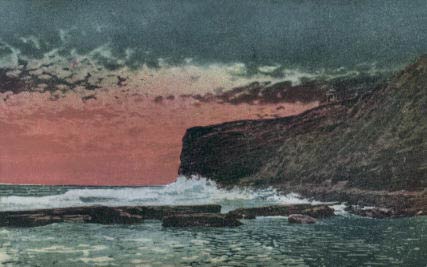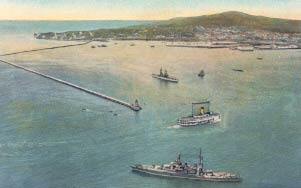
A Visit to Old Los
Angeles and
Environs
25. San
Pedro.
by
Brent C. Dickerson
Copyright © Brent C. Dickerson
Index to Episodes (click here)
A Visit to Long Beach Harbor, Los Angeles
Harbor, and San Pedro.
• The next morning at the breakfast table, young Frederick Johan was studying three aërial postcard views of the area we were to jaunt to that day. "This," he said, with a professorial air which made Charley look at him with narrowed eyes, "is what the harbor area would look like from here if we sprang a quarter mile into the air." Minnie, hardly awake, sighed deeply and said, "Don't try to add anything to my mind; it's still full of 'oom-pah-pah' from last night." For his part, Papa just looked at the card and said, "Well!". "If I sprang a quarter mile into the air," allowed Anna, "I should be looking below me for a mattress to land on."

• Prof. FJ continued, "And this is the main channel." "Frederick Johan," said Mother, "if they printed on that card that that showed the high road to China, would you be telling us that this was the high road to China?". FJ looked at the card for a moment, then said, "And this is what the card alleges is the main channel." The baby looked at it, turned it upside-down, then dropped it into a pot of jam. FJ cleared his throat; "That is, this is what the late card alleges is the main channel."
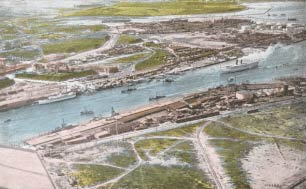
• "Finally," concluded our lecturer, "this card claims to represent, and indeed appears in good faith to represent, where the channel exits to the open water at San Pedro." "I already feel quite edified this morning," said I. "Then may I have the rest of your breakfast?" asked Charley.
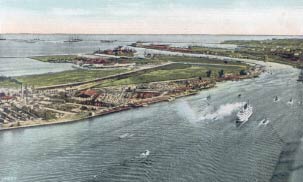
• Papa had had the front desk rent an automobile for us, but declared that he had had enough automobile-driving "going from the arid heights of the mountains to the misty flats of sea-level" the other day when we visited Hollywood and Venice; and so left the driving to Charley, who I must say seemed thoroughly delighted at this turn of events, trying the horn several times, "for safety's sake!" as he said, though I noticed some pretty girls happened to be strolling by each time. The hotel was already on the edge of town; and, driving west, we quickly entered the world of the harbor.
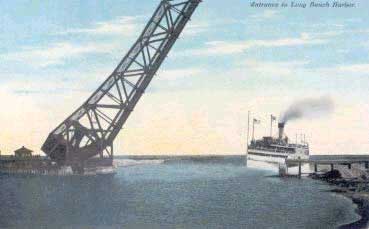
• Well, dear, I must report that the ladies in the party—between the ocean breezes and Charley's driving—were at their wits' end to keep their hats straight. The shipyard sights were also perhaps not the most appealing to the feminine element in the car, each of whose faces took on a look of resigned suffering not unlike you'll recall the saintly Esther Lofgren's face when she had the hives last Fall. We gentlemen—and in particular young Frederick Johan—feasted our eyes and ambitions on the great works being conducted on a titanic scale first on one side of us and then on the other!
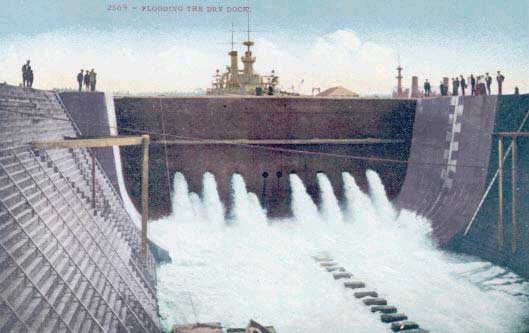
• "It occurs to me," said Papa, "to wonder just how you start a-building a ship." I thought for a moment, then said, "Perhaps someone holds up a sheet of steel, and says, 'Here, rivet something to this.'" "They'd need someone else to stand by and hold up the plans," observed young Frederick Johan. "See," said Charley, "this is the labor problem in a nutshell. We've only got one sheet of steel and a few rivets of a boat, and already we need three workers." Minnie sighed and looked at a crew of men working on a huge hull. "I wonder where they take their lunch," she said to no one in particular. "Not where we're taking our lunch! I can guarantee that!", exclaimed Mother, shielding the baby's ears from the noise of the riveting going on all around us.
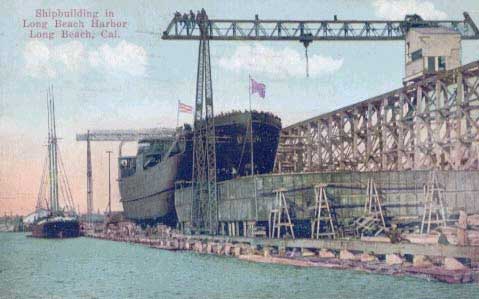
• From Long Beach, we had passed onto Terminal Island, where, on its seaward side, there was a very delightful and remote-feeling bathing beach.
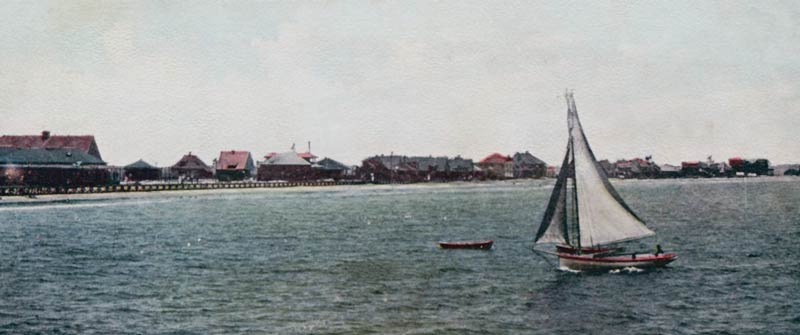
• Her eye on some young gentlemen strolling along the beach in their underwear—er, dear, I mean "bathing suits"—Minnie pleaded for a moment's stop so she could "step out for a breath of fresh air." As she opened the door to alight, young Frederick Johan mentioned, "This used to be called 'Rattlesnake Island'." Minnie peered about for a moment, then decided that she had had enough fresh air, while Mother declared that she thought she saw "a couple of snakes-in-the-grass right now." As he drove on, Papa added that he thought the hotel lobby had a few of them too.
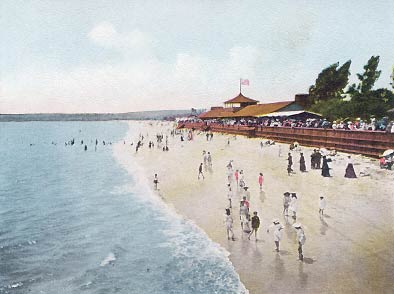
• At the far end of Terminal Island there was a ferry to take us across the main channel ("—Or what appears to be the main channel," said FJ) to San Pedro. Anna said, "I must say I feel a bit unnatural riding an automobile over the waves." Said Minnie, sharply, "Charley, do put the hand-brake on!" Mother became a little exasperated and said, "Girls, if you go hog-wild, I'll be pleased to leave you in the next wallow we come to; this ride is as smooth as row-boating over a pond." Having endured this perilous voyage, we motored off the ferry on the San Pedro side, and started going along towards San Pedro proper.
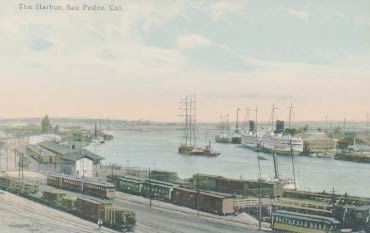
• Train-tracks, flatbed cars, locomotives, cargo, freight, and warehouses were in every which direction. There was a Southern Pacific depot right on the water. I saw one of the Los Angeles trolleys coming along there too; it seemed like an old friend. We stopped for a moment at the train depot to stretch our legs. "May we park here?", asked Charley of a uniformed man standing in front. "Why, yes, mister—pull 'er right in up here. That'll be fifty cents, please." We walked over to a bench on the waterfront side of the depot, Charley grumbling about the high price to park. A portly man on the next bench looked up and said, "What's that, son? You paid to park your automobile here? Hey, Chet!"—he called through a little window in the depot—"he got another one! Well, let me tell you, son: that was Eddie the messenger-boy; conning people into paying to park is how he gets his beer-money. You no more have to pay to park here than you have to stand on your head and whistle 'Dixie'. You ought to be more careful." Charley blinked, turned the other way, and said, "If that don't beat all!" Meantime, young Frederick Johan volunteered that he could stand on his head—and promptly did so. "Now, whistle," said I. The portly man witnessed this performance, and said—not with much spirit, I'm afraid—"You've got a fine boy there. Hope no one drowns him."
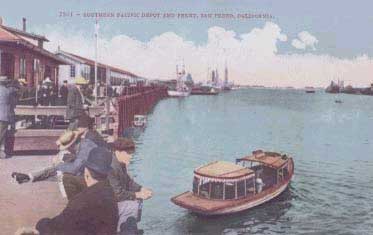
• The water, the ships, the trains, the tracks, the road, and the town all came together making quite a busy scene. Papa took in the panorama and said, "Folk, this is a man's town, a man's town indeed..." Mother tensed her lips; "I've never been in a town that wasn't," she said. Me, I just looked off into the distance.
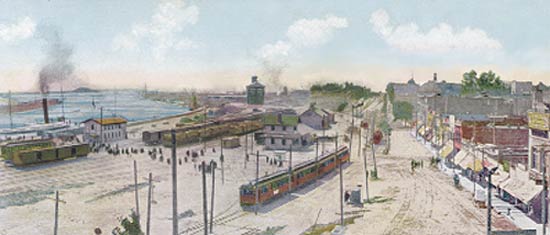
• Later, quiet Anna found this very clean and calm-looking view of the waterfront; and that island, well—it sounds like something out of a pirate story, but it's called "Dead Man's Island." I doubt that this area ever looked quite this clean and depopulated.
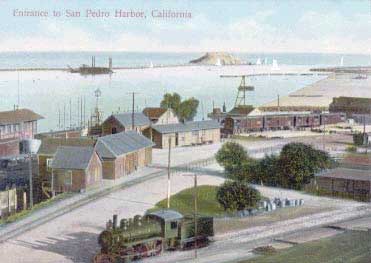
• Lumber seems to be quite the commodity here; the very air smells of it. From the depot, we walked out onto a pier . . . where young Frederick Johan very nearly got himself run over by a flatbed car rumbling along the tracks. A stevedore commenced advising us of his thoughts in language which would have been more effective had we had any idea what most of the words meant; but then the ladies, led by Mother, stepped out—rather aggressively—from between some cargo boxes, and the man's philippic abruptly dwindled into "Well . . . just watch out, ok?," plus a few more words lost to the wind as he turned away. FJ started walking out further "to ask the man a question about shipping"; but Papa grabbed him from behind by the belt and said, "Well, I think we can find someone to ask in this direction too I bet"; and we returned to the depot.
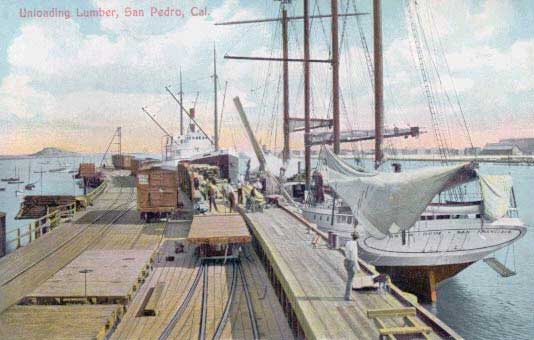
• We had sat at the depot watching the ships go by for quite some time when Papa spotted one, looked at it closely, and, pointing, said, "Folk, that fine vessel you see going past now—" "You mean the rowboat?" asked young Frederick Johan. "No, son—I mean the large fine-looking one out there past it. That is the very ship we'll be sailing to Santa Catalina Island on tomorrow morning." And we all looked at it silently for a moment. Finally Minnie said, "Is it really large enough to go on the ocean?", which Papa chose to ignore.
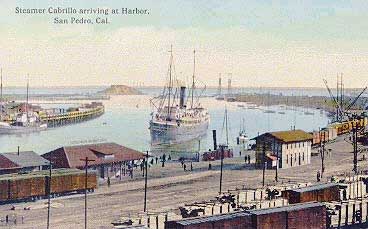
• We crossed all the tracks and roads and walked up to the town buildings along the front street. We were hungry for lunch; and Papa noticed—a block away—a place with a sign stating "STEAKS . . . OYSTERS . . . MUSHROOMS"; "surely a fine establishment!" declared Papa, herding us in its direction. As we walked there, I heard Charley saying, under his breath, "Steaks . . . Oysters . . . Mushrooms . . . ? Hm!." Mother halted our march a yard away from it. " 'Tis a beer hall!—or worse!" she said. "I shall see to it that no one forces beer down anyone's throat," quoth Papa. We stepped in; and I must say that it had "a certain atmosphere."
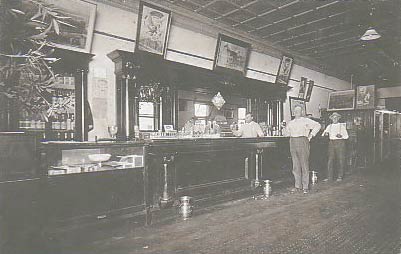
• The bartender took a look at us through the smoke and rang a bell he had at arm's reach; immediately, a nicely-dressed man came out from "in back" and, all smiles, said, "Step this way, folks—mind the spitoons, young lady—right this way; I keep a booth back here just for fine folks such as yourselves." He pulled aside a little curtain, and revealed a sunny little cove in the bay window with a neat table and chairs and a wide view of the harbor. Much to my surprise, we had a good filling meal there in our private booth, good service from our well-dressed waiter; and the only things intruding on us from the other side of the curtain were some wisps of cigar-smoke, and the constant sound of people going up and down the stairs. As we were leaving, and the ladies had gone on before us, Charley motioned the waiter aside, and, with a wry smile, said, "Bit of a boarding-house you've got here, no?". "Short-term, sir," said the man, with a wink. "Successful?" "Best in town, sir; only the better sort. Be glad to see you some night, sir! We're all friendly here." And he stuffed a cigar into Charley's pocket. Charley was about to continue the conversation when Papa came back and nabbed us both. "Come along, boys." Mother gave us a bit of a look when we came back out onto the street where they were waiting, and then asked, "So how was the view upstairs?". Just then, not twenty-five feet away from us, we heard a screech, and turned around to see a trolley just coming to a halt after running off the tracks. But no one hurt, just two sailors with scratches on their hands, and a reverend with a bloody nose.
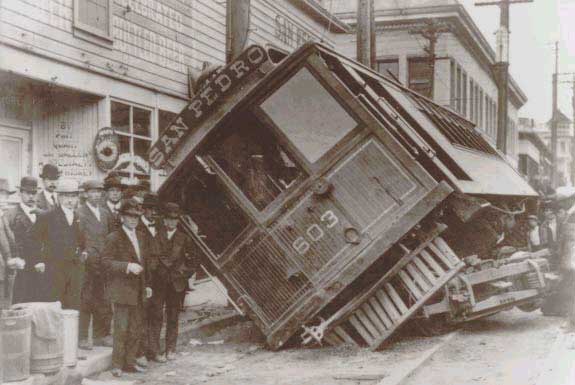
• Leaving all the noise and bustle of the accident behind us, we walked up the front street to the next corner, and turned inland.
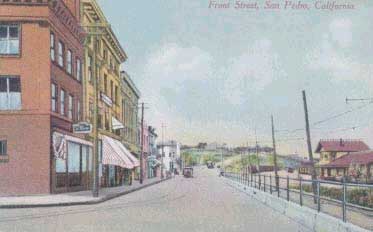
• We were on Sixth Street. After a few moments of consideration, young FJ said, "It appears to me that the vehicles here date from a couple of decades hence." "Hence?", I asked. "Hence," said he. Charley drew a breath to say something; but, before he could, FJ slipped in, "—Not to be a bean-counter, of course."
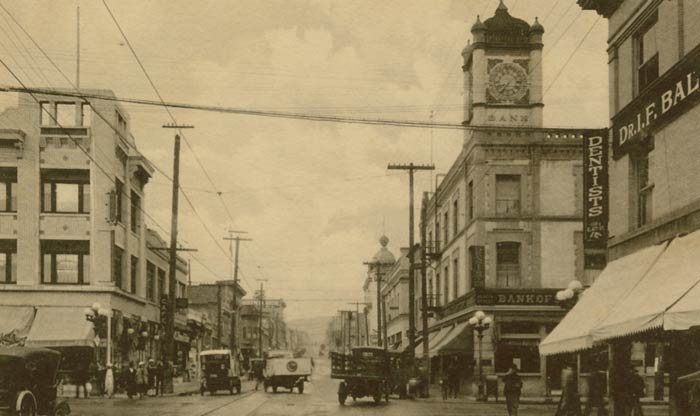
• We were at the intersection with Beacon Street, the main business street of the city. Mother had taken an instant dislike to the whole municipality, looked up and down the street with a jaundiced eye, and said, "The three of you [meaning Papa, Charley, and me] may do as you please; but Frederick Johan will escort the rest of us back to the automobile. Come, girls."
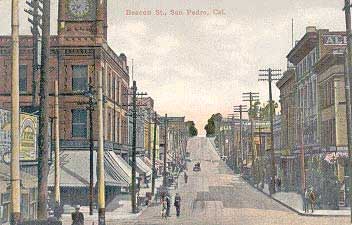 | 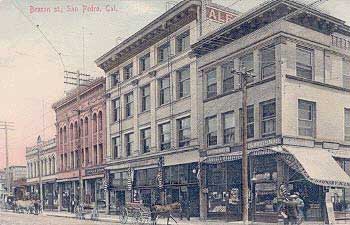
|
• The three of us looked blankly at each other for half a moment or less, when Papa—always quick on his feet—dashed in the departing party's direction. "Why, Mrs. S—just what I was aching to do myself," he was saying as we caught up to him. "But there's the City Hall and a park, not more than a block or two away; let's take in the fine view on our way back."
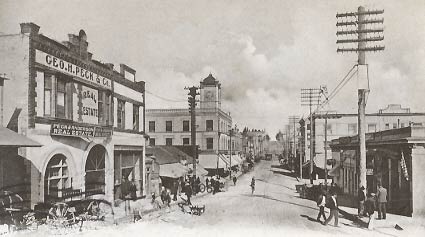
• And so it was that Papa successfully herded the lot of us down the street to City Hall.
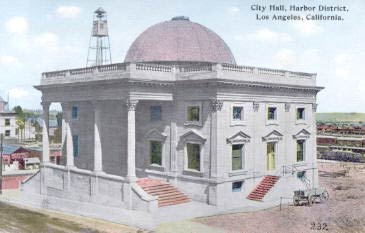
• As Charley and I discussed later, this route brought the concept of "on our way back" to the breaking point; "but I should call it a triumph of diplomacy," added Charley. The clock-tower which can be seen immediately to the left and behind the City Hall building can also be seen nearer at hand in the other views of Beacon Street above.
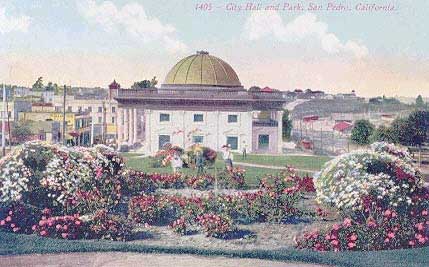
• A little elevation gives us a good look at the surroundings. Downtown Los Angeles would be about twenty miles distant in the middle left horizon. On a clear day, from Pound Cake Hill back in downtown L.A., they could see ships in the bay here.
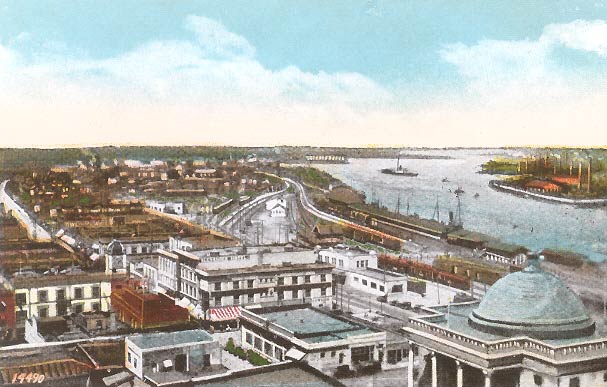
• We rested a spell in the quiet park near City Hall.
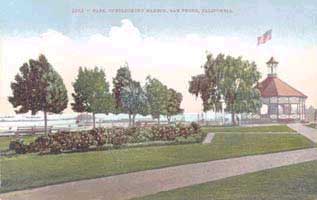
• Minnie was complaining that her shoe was pinching her. "Take it off!" suggested young Frederick Johan. "Yes," quoth I, "be a child of Nature; go barefoot through the grasses and paths." Massaging her shoe discreetly, Minnie said, "If children of Nature choose to go through life with feet cut and bruised, that's their affair; I'm sure that if there is a fish-hook within a quarter-mile of here, my bare feet would pick it up before I took three steps."
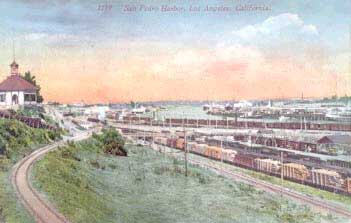
• FJ spotted a stairway down from the quiet heights of the park to the busy flats below; and, hearing a lot of machinery, we gentlemen—baby included (I held him in my usual "sack of potatoes" style, despite your best efforts, dear, to teach me otherwise)—stepped down to watch boulders getting hauled out to the breakwater. After we had watched intently from one of the stairway landings for about ten minutes, I was poked in the ribs by Charley, who pointed out that Mother, Anna, and Minnie had hurried via another stairway and beat us to the bottom. "And they've been throwing pebbles at us!" he added.
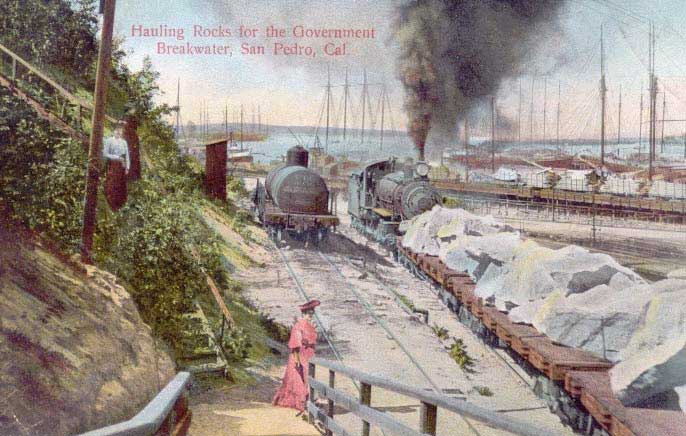
• Off to our right was the City Wharf. There had been a landing of some sort here since the earliest days, if I understand it right.
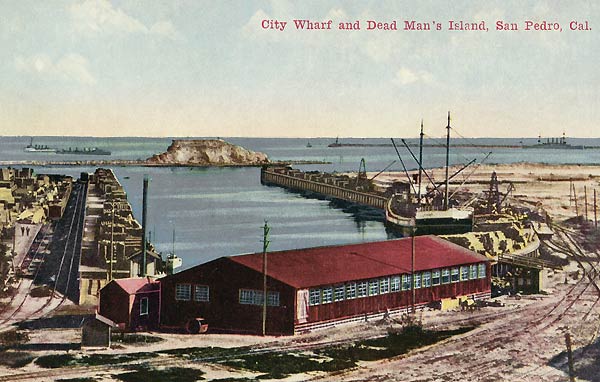
• A little farther along, the breakwater stretched out before us like a big question mark.
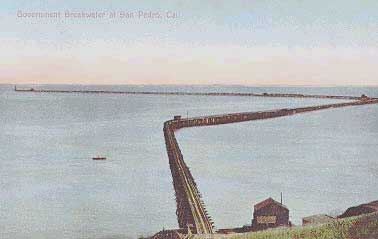
• Papa had gotten to chatting with an old salt—you know how he can't stand anywhere for fifteen minutes but that everyone wants to get to know him—and the long and short of it was that we were all invited "to look at San Pedro from the water" in his little boat. Papa and young FJ were enthusiastic, I was curious, the ladies were "not dressed for boating," the baby was non-committal, and Charley offered—very quickly— to stay with the ladies. And so it was that Papa, FJ, and myself went boating for an hour.
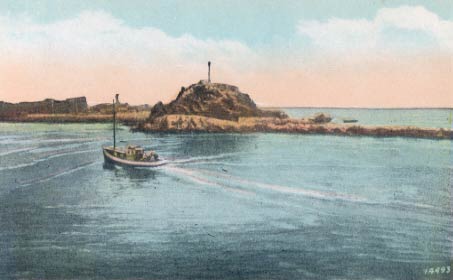
• We went across the channel towards Dead Man's Island. It seems that one fine day before California was absolutely part of the U.S., the citizens of Los Angeles booted out the American military for being obnoxious and sent them packing onto their ships here at San Pedro; the result of a little battle or two was that some marines were killed, and the only land the Americans could commandeer for burial purposes was this little island in the harbor. Our admiral tied up at a little wharf; and we three, led by young Frederick Johan, clambered up to the island's little plateau, where, by vigorous waving of my coat-jacket, we caught the attention of our mainland party across the channel. Charley indeed returned the favor by plucking Minnie's hat off her head and waving it back at us ("It was the largest and most colorful thing we had," he explained later).
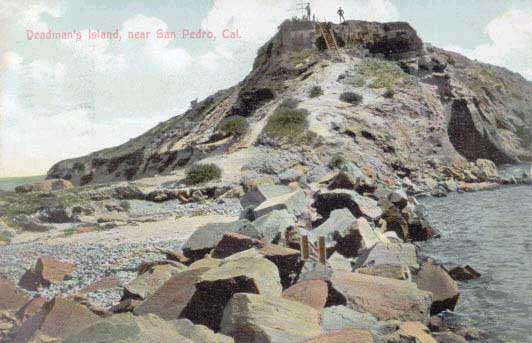
• Our dreadnought then took us just a bit outside the breakwater—which (so said the admiral) was haunted, along with Point Fermin and a good part of San Pedro itself. "The ghosts certainly have a lot of elbow-room, then, it sounds like to me," quoth Papa, who had always been impatient with people believing in spooks. "We have a hard enough time on Earth before we die," he had said to me once upon a time; "I really do doubt—I do indeed—that anyone would want to come back again after the fact." Anna told me later that meantime, back on terra firma, on seeing us sail away, Mother had remarked, "Well, and so we're to be abandoned to the natives..." From the far point of our little ocean voyage, just outside the entrance to the harbor, we looked back at Point Fermin. Seeing young Frederick Johan gazing at the cliffs of the Point, the admiral—who it must be said seemed to have a taste for the weird and gruesome—told him that people—"lonely people, disappointed lovers, housewives whose milk had turned sour" was the way he put it—throw themselves over the edge there all the time, onto the rocks. "In fact," quoth he, "there goes one now." "—I didn't see anything!", exclaimed young FJ, with disappointment. "Well, you have to know where to look. Why, there go two more! It's not often you get a two-for-one." "I still didn't see anything!" Papa had had enough of this fooling, and said, "Don't horrify the boy, admiral; he'll get 'hair on his chest' soon enough." Our seaman muttered something unintelligible under his breath, and turned the boat back towards shore.
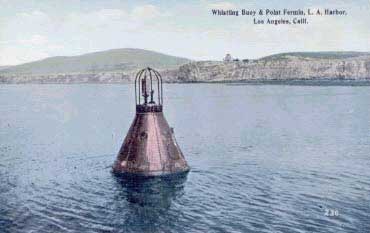
• Papa thought that a visit to Point Fermin would top off the day perfectly; and so, once back on dry land and the folk herded into the automobile, we drove through San Pedro towards "the brink." Beyond the downtown area, San Pedro is full of the prettiest little flowery homes; we frequently saw children, or the ladies of the house, out cutting flowers. "Seamen's wives pining away for their men...", quoth Anna, to which Minnie added, "—And afraid their husbands will come home first!", which earned her a sharp pinch from Mother.
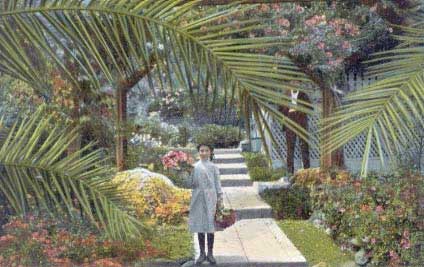
• We passed the Barton Hill School, which seemed cozy and home-like compared to those we had seen in Los Angeles and Long Beach.
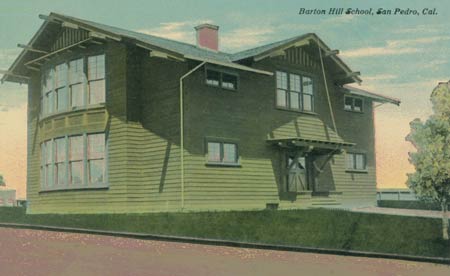
• Among the houses, but at the edge overlooking the water, was the clubhouse of the South Bay Yacht Club. Planned in 1903, this "Swiss chalet-style" building, on Crescent Street, wasn't open for club activities until February 9, 1907. "What's the mast for?," asked young Frederick Johan. "Well," said Papa, "you know how sailors have flags and banners and pennants for everything, to tell each other messages from a distance." "Yes," said young FJ, as Mother gave Papa a suspicious look. "Let's say, then, that you're out in a boat, floating along nice and easy, not a care in the world, the happiest man on earth, and meantime your wife—and she is a lovely wife, of course—all of them are—and your wife storms into the clubhouse looking for you, because you've missed having tea with your great-aunt Antonia and her third husband Nipper. As soon as she clears out, the clubhouse-man shoots up a little flag saying 'big storm on land; stay out at sea!'."
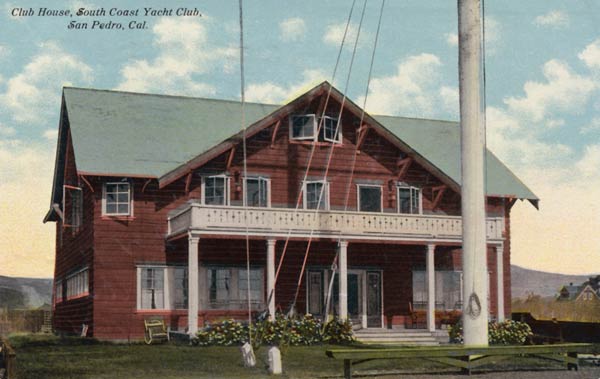
• The houses gave way to the pretty rough area around the cliffs. In a field near the edge, there was this building, a sign on which cheerfully told us that it was Peck's Pavilion. "Seems a pretty out-of-the-way place for such a thing," said Mother. Minnie ran her eyes over it once, frowned, and—no doubt noting that it had neither food nor men, and was in point of fact completely deserted—said, "I wonder what it could be for." "Maybe it's a morgue!" was the outcome of young Frederick Johan's hopes about it. Papa hesitated, and offered "I should say, yes, I do think it's for dancing of an evening." This made Anna's eyes sparkle, and she said, softly, "Oh, that would be such a good time, with the waves crashing below." Charley surveyed the scene. "It would be romantic," was his opinion. "Oh, yes," continued young FJ; "and think of the convenience. Disappointed in love at the dance, heart broken forever and ever, you know, a few easy steps, sobbing a bit to make it look right, look for some good sharp rocks below, or maybe a place where the water comes up to the base, a deep sigh, maybe two if someone's watching…" "Oh, don't be stinting, FJ," I interrupted; "make it three, to show sincerity." "Yes, of course, three deep, heavy, and soulful sighs, a 'Goodbye cruel world!', a nice hearty leap, maybe throwing a flower just as you go, and there you have it—troubles all over." He reflected for a moment, then added, "They should light the way." "Mother," said Minnie with a pained look, "why must children be so trying?" Well, this made both Mother and Papa burst out laughing, and it seemed to be the collective decision of the rest of the party not to ask them why.
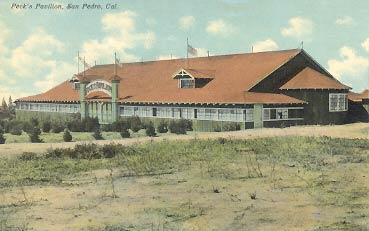
• Papa drove on another hundred yards or so, and parked. Mother and Minnie, in no mood for "roughing it," stayed in the automobile. Anna got out for a moment with the rest of us, and peeked over the edge of the cliff; but, for all her love of Nature, she found the precipices, crashing waves, and blustery ocean winds "a bit violent," and so quickly returned to the safety of our vehicle. Papa, however, stood on a point high above the water, looked to the far horizon over the gray-blue ocean, his beard whipping in the breezes, and called out, "Boys, this is grand. Grand!"; and we were loth to disagree.
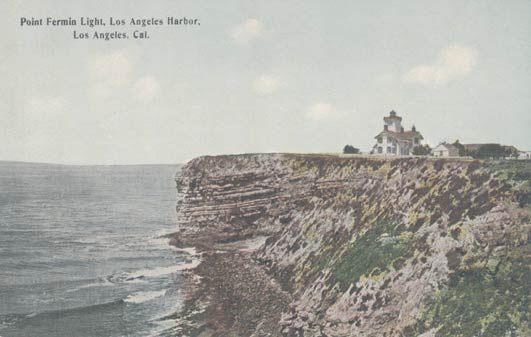
• We heard a "Hey!" from young Frederick Johan, and turned to find him nowhere in sight. The sound of rocks tumbling down the cliff off to the left brought us at a run to a place where—to our partial relief—we saw FJ scampering down a narrow foot path to the water's edge a hundred feet below. "If that boy lives to cast his first vote, it will be a miracle," quoth Papa; "go fetch him, gentlemen, unless he gets swallowed by a whale first, and meantime I'll wait up here and plan out your funerals." What with the noise of the surf, and the wind blowing our shouts away, young Frederick Johan was unaware that we were trying to nab him, and so had a considerable amount of time to explore the rocky, jagged beach, particularly as Charley and I were pretty delicate in our maneuvres down that foot path, which was more like a rocky ladder than it was like any trail we had ever trod. Patches of cactus made mis-steps and losses of balance even more exciting. Weird whistles and moans from that buoy offshore gave the scene a dream-like quality; and I shouldn't have been surprised to have seen a mystical boat come up and bear us off like King Arthur to Avallon. But no such luck—on reaching bottom relatively intact ("I lost my cigar!", lamented Charley), we had some boulder-hopping to do in order to catch up with young FJ, who was examining some sea-weed on a remote, spray-sodden rock, water swirling and hissing around it with every breaker. "This is very interesting," said he on my approach. "Stick it in your pocket and let it be interesting back on dry land," said I, grabbing him by the hand and delivering him into Charley's custody. "And so, my fine young man," said Charley, "do you think it's as easy to go up as it is to go down?" FJ looked at him blankly. "Go on," said Charley, trying—but not very hard—to hide his exasperation, "show us the way up!". After an extended period of time, replete with scrapes, slides, and young FJ falling onto my head, we managed to make our way back up the trail, Papa pulling each of us the last couple yards onto the flatland at the top of the cliff, where we found a reception committee of the rest of the family. After he had rested a moment, Frederick Johan pronounced that "this was an interesting experience," and ran off to our automobile, sitting there quietly until the rest of us got there as well. We all sat there for a moment of pregnant silence until Papa cleared his throat and said, "Next time, Mr. Lewis and Clark, please let me in on your plans of exploration before undertaking them. If you please." "Yes, sir," said FJ, hardly moving a muscle for the rest of the day.
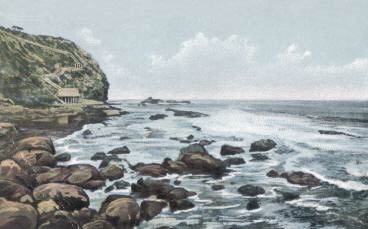
• The day was getting on; but we drove along the shore just a little and ran across this cove. Minnie looked at the scene and said, "That's the most methodical way of gathering sea-shells I've ever seen." In a little voice from a deep corner of the back seat, young Frederick Johan volunteered that "I think they're after the meat inside."
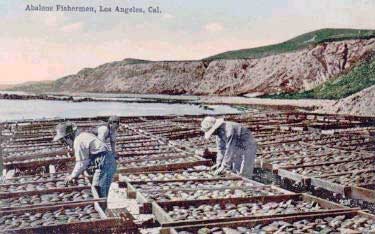
• The sun was getting low in the sky. Papa announced that "We've got an ocean-voyage tomorrow, folk—dinner and a good sleep are what we need tonight!" To the consternation of the rest, I took a notion "to stay here a bit. You all go on back—I'll be o.k.—I'll catch a trolley back—it lets off right in front the the hotel, you know." Mother turned to Papa and said, "I've often wondered if there is insanity in your family, Mr. S." He placed his tongue in a hollow of a tooth and responded, "On days like this, Mrs. S., I often think there is." And so they left me off back at Point Fermin, solemnly adjuring me to "find a telephone somewhere and call the hotel if things don't work out." I splashed through some shallow water to sit alone on a rock among the waves, as the water hissed around me.
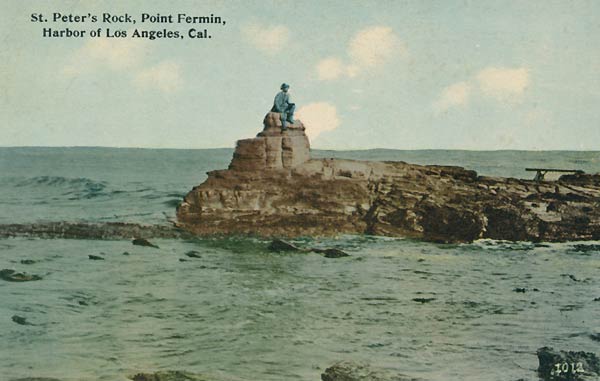
•And I watched the setting sun.
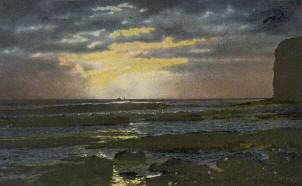
• Somehow, dear, I suddenly felt so close to you.
